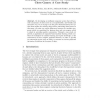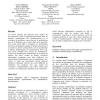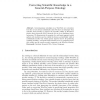333 search results - page 63 / 67 » Game-Driven Intelligent Tutoring Systems |
CG
2008
Springer
13 years 9 months ago
2008
Springer
Abstract. By developing an intelligent computer system that will provide commentary of chess moves in a comprehensible, user-friendly and instructive way, we are trying to use the ...
ITS
2000
Springer
13 years 11 months ago
2000
Springer
This paper presents an approach to the design of a learning environment in a mathematical domain (elementary combinatorics) where problem solving is based more on modelling than o...
ITS
2010
Springer
13 years 9 months ago
2010
Springer
General-purpose ontologies (e.g. WordNet) are convenient, but they are not always scientifically valid. We draw on techniques from semantic class learning to improve the scientific...
ANLP
1997
13 years 9 months ago
1997
Language learning is a relatively new application for natural language processing (NLP) and for intelligent tutoring and learning environments (ITLEs). NLP has a crucial role to p...
IJMMS
2007
13 years 7 months ago
2007
Predicting when a person might be frustrated can provide an intelligent system with important information about when to initiate interaction. For example, an automated Learning Co...



